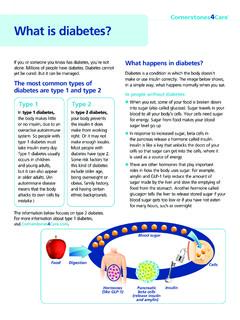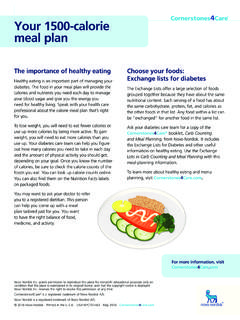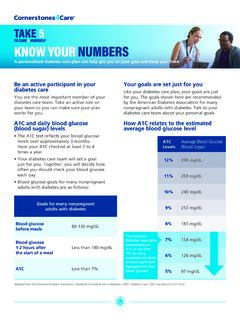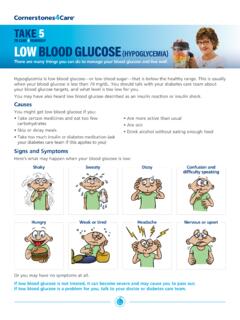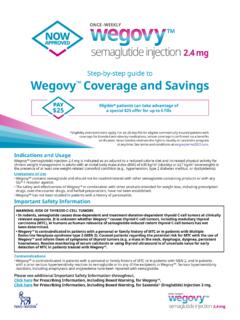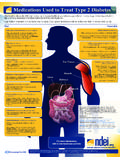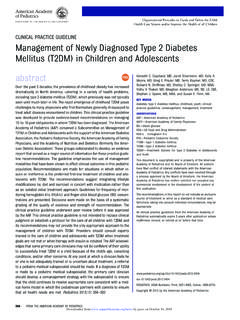Transcription of Type 2 diabetes changes: How and why - NovoMedLink
1 What happens in type 2 diabetes ? When you have type 2 diabetes , some or all of these things may happen:1. The gut (made up of such organs as your stomach and intestines) doesn t release enough of a hormone called GLP-1. One of GLP-1 s jobs is to slow down the release of food from your stomach, which slows down the movement of sugar into your blood. When there is not enough GLP-1, food moves quickly from the stomach, so blood sugar levels go up more The beta cells in the pancreas don t produce enough insulin. This leads to too much sugar in the blood instead of in the muscles and other places in the body where sugar needs to go. 3. A hormone called glucagon doesn t work right, so the liver releases too much sugar, keeping blood sugar levels high after meals and The liver normally slows down its release of sugar into the blood if blood sugar is high.
2 But in people with type 2 diabetes , too much glucagon is released. This causes the liver to release more sugar into the Your muscles get their energy from sugar. But in people with type 2 diabetes , insulin has trouble moving sugar into muscle cells, so it stays in the blood. This is referred to as insulin resistance. 6. There is not enough GLP-1 to signal your brain to help your body reduce food Fat cells are insulin resistant too, which can lead to higher blood sugar The kidneys don t get rid of extra sugar when blood sugar levels are high, so it goes back into the type 2 diabetesWhat happens when you eatWhen you eat, some of your food is broken down into sugar (also called glucose). Sugar travels in your blood to all your body s cells. Insulin helps sugar move from your blood into your cells.
3 Insulin is a hormone that is made by the beta cells in your pancreas. The image below shows, in a simple way, what happens when we diabetesIn people with type 2 diabetes , there may be fewer beta cells in the pancreas. The beta cells may stop working and may make too little insulin. Or they may make enough insulin, but the body doesn t use it properly. That prevents it from working to lower blood cellsRelease of insulinOther pancreatic cellsOther pancreatic cellsPancreasWithout diabetesIn people without diabetes , beta cells in the pancreas make and release insulin to keep blood sugar levels cellsRelease of insulinPancreasType 2 diabetes changes: How and whyNovo Nordisk Inc. grants permission to reproduce this piece for nonprofit educational purposes only on condition that the piece is maintained in its original format and that the copyright notice is displayed.
4 Novo Nordisk Inc. reserves the right to revoke this permission at any time. Cornerstones4 Care is a registered trademark of Novo Nordisk Nordisk is a registered trademark of Novo Nordisk A/S. 2016 Novo Nordisk All rights reserved. USA16 PCT01533 July 2016 more information about diabetes , visit Type 2 diabetes changes: How and whyWhy does diabetes change over time? diabetes changes over time because of changes that take place in the way the body responds to what you eat and drink. In people with type 2 diabetes :n The ability of the pancreas to make more insulin to make up for insulin resistance changes over time n Beta cells are reduced in both number and function. In fact, research suggests that many people with type 2 diabetes may already have lost about 50% to 80% of their beta cell function by the time their diabetes is diagnosed.
5 As the beta cells decrease even more in both number and function, the pancreas makes less and less insulinSeveral other things may also happen over time:n The body s cells change and become more resistant to insulinn The other events listed on page 1 happen as well Because of these changes, your blood sugar can stay too high. This can increase your risk for other health problems. But by following your diabetes care plan, you can do a lot to prevent these problems or slow them can you do? As type 2 diabetes changes over time, following your meal plan and staying active often may not be enough to keep your blood sugar in check. n Medicine is usually necessaryn The good news is that there are effective medicines to treat all stages of type 2 diabetesn Talk with your diabetes care team about the best treatment for youn Do your best to keep your weight close to a normal rangeEnroll today to get FREE, personalized diabetes support with Cornerstones4 Care.
6 Meal Planning Tools Create tasty, diabetes -friendly mealsInteractive TrackersRecord A1C, weight, and blood sugar numbersDiabetes Health Coach An online program that builds a customized action plan around your needs to help you learn healthy habitsSupport and diabetes management tools built around you. * Phone number:( ) * Cell phone number:( ) Enrolling is easy. Just complete this form. All fields with asterisks (*) are REQUIRED.* q I have diabetes or q I care for someone who has diabetes * First name _____* Last name _____ MI _____ * Address 1 _____ Address 2 _____* City _____* State _____* ZIP _____ * Email _____* Birth date mm/dd/yyyy / / * What type of diabetes do you or the person you care for have? (Check one) q Type 2 q Type 1 q Don t know* What type of diabetes medicine has been prescribed?
7 (Check all that apply)q Insulin q GLP-1 medicineq None q Otherq diabetes pills (also called oral antidiabetic drugs, or OADs)* If you checked Insulin, GLP-1 medicine, or Other, please fill in the following for each: Product 1: _____How long has this product been taken?q Prescribed but not taken q 7-12 months q 0-3 months q 1-3 years q 4-6 months q 3 or more years Product 2: _____How long has this product been taken?q Prescribed but not taken q 7-12 months q 0-3 months q 1-3 years q 4-6 months q 3 or more yearsNovo Nordisk Inc. ( Novo Nordisk ) understands protecting your personal and health information is very important.
8 We do not share any personally identifiable information you give us with third parties for their own marketing use. I understand from time to time, Novo Nordisk s Privacy Policy may change , and for the most recent version of the Privacy Policy, please visit By signing and dating below, I consent that the information I am providing may be used by Novo Nordisk, its affiliates or vendors to keep me informed about products, patient support services, special offers, or other opportunities that may be of interest to me via mail and email. Novo Nordisk may also combine the information I provide with information about me from third parties to better match these offers with my interests. These materials may contain information that market or advertise Novo Nordisk products, goods, or services.
9 Q Yes, I d like to be contacted by Novo Nordisk via phone calls and text messages at the phone numbers I have provided. By checking this box, and signing and dating below, I authorize Novo Nordisk to use auto-dialers, prerecorded messages, and artificial voice messages to contact me. I understand that these calls and text messages may market or advertise Novo Nordisk products, goods, or services. I understand that I am not required to consent to being contacted by phone or text message as a condition of any purchase of goods or services. I may opt out at any time by clicking the unsubscribe link within any email I receive, by calling , or by sending a letter with my request to Novo Nordisk Inc., 800 Scudders Mill Road, Plainsboro, New Jersey 08536. By providing my information to Novo Nordisk and signing and dating below, I certify I am at least eighteen (18) years of age and agree to the terms and complete below.
10 * Signature (required) _____* Date (required) _____ mm/dd/yyyyCornerstones4 Care is a registered trademark of Novo Nordisk A/S. Novo Nordisk is a registered trademark of Novo Nordisk A/S. 2016 Novo Nordisk 000732171 All rights reserved. USA16 PCT01533 July 20163 easy ways to enroll:1. Fax the completed form to 1-866-549-20162. Email the completed form to Call 1-888-825-1518 and follow the voice prompts

